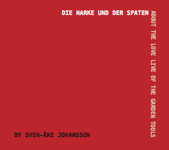|
|
 |
Dusted Reviews
Artist: Sven-Åke Johansson Album: Die Harke und der Spaten Label: Umlaut Review date: Mar. 15, 2012 |

|
|
|
 |
Somewhat surreally (or even alarmingly), Sven-Åke Johansson’s Die Harke und der Spaten (or, The Rake and the Spade) is a musical stage play about the love life of garden tools! It is a piece for one singer/speaker plus a musical ensemble. During a performance, the two tools are presented on stage in eight different positions that serve as the starting points for the scenes, until the ninth position is a handle with a rake and spade at its two ends, representing “the offspring.”
The music is a composed-improvised piece of five parts, here featured in a version recorded in Malmö in 1998. Johansson himself plays accordion and provides recitation/vocals. He is joined by Axel Dörner on trumpet, Mats Gustafsson on saxophone, Per-Åke Holmlander on tuba and trombone, Sten Sandell on piano, Matthias Bauer on bass, and Raymond Strid on percussion – the kind of improvising supergroup that whets the appetite, irrespective of the material.
In the event, the flow and momentum of the music is broken up by Johansson’s intermittent recitations (in German or, occasionally, English). Judging by the tone of some of his utterances, he is describing the goings-on between the two tools, so they were clearly essential to enjoyment of the live play. While these recitations are in progress, the players improvise accompaniment that adds emphasis and drama.
Away from the recitations, the ensemble shows itself to be as adept at improvising as the above personnel list indicates it should be; they largely concentrate on collective improvisation, with piano, bass, drums and Johansson’s accordion all prominent but the wind instruments only making occasional interjections and punctuations, not being dominant. On more than one occasion, the shifts between scored themes, improvisation and spoken word are reminiscent of the theatrical works of the Willem Breuker Kollektief, albeit without their pronounced sense of irony and anarchy.
Overall – as with soundtracks, incidental music etc -- the album raises the much-discussed question of the role of music that was not originally designed to be heard in isolation away from the other medium. In this case, while it does not succeed unreservedly, there will be more than enough here to amply satisfy aficionados of improvisation.
By John Eyles
|







